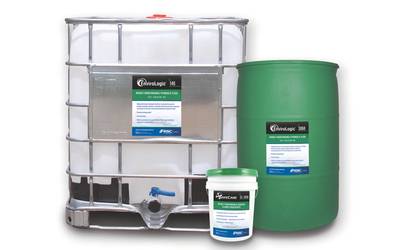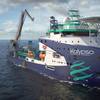RSC Bio Solutions Busts Myths Surrounding Readily Biodegradable Fluids
There’s a lot of conflicting information related to readily biodegradable lubricants and fluids. What’s the real story?
The U.S. EPA’s 2013 Vessel General Permit (VGP) requirements are now in place requiring the use of environmentally acceptable lubricants (EALs) in oil to water interfaces for vessels over 79 feet. The VGP revision also requires any above water line hull cleaning or deck washdowns resulting in discharge to be conducted with appropriate cleaners and detergents.
RSC Bio Solutions has teamed up with Maritime Reporter and Engineering News, MarineLink.com and Marine News to host a webinar that will explain the 2013 VGP EAL regulations and what impact they now have on marine transportation, offshore oil and gas and marine construction operators. The webinar will also outline a “no worries” path to compliance for operators by using tested, approved and technically feasible EALs across a broad range of equipment and component applications.
The webinar, Complying with New EPA Lubricant, Cleaner Requirements for Marine, Offshore Industries, will be held on Thursday, June 12, 2014 at 2-3:15 p.m. EDT.
To register, visit webinarrsc.navalprofessional.com.
RSC Bio Solutions says thorough knowledge of the competitive landscape and product attributes is critical in making a purchasing decision, particularly in an area where there is serious potential negative environmental impact. However, some pervasive misconceptions exist in the industry. In hopes of helping to educate the market on key issues such as performance, risk reduction and sustainability, RSC Bio Solutions offers the following insights.
Myth 1: Major oil spills in ocean environments are responsible for the bulk of environmental contamination.
According to the National Oceanic and Atmospheric Administration (NOAA), roughly 706 million gallons of petroleum are released into the ocean each year. Many believe that the bulk of this is caused by major catastrophic oil spills. However, the facts demonstrate that small spills or minor leaks add up significantly over time. In reality, a 2010 study estimated that between 10 and 16 million gallons of spills are caused by poor maintenance practices or regular leaks and spills. This means that those companies who truly wish to be environmentally responsible must take a look at the full range of their equipment, maintenance processes and product use to make the most sustainable choices.
Myth 2: Petroleum based fluids perform better than readily biodegradable alternatives.
There are a wide range of performance levels among both readily biodegradable and petroleum based products and lubricants. Consumers have a wide array of options from less expensive, lower performance lubricants to the high-end, high performing products. While care must be taken in choosing the appropriate product for the specific application, readily biodegradable products also fall into this range. It’s important to know that some readily biodegradable products provide higher performance results than petroleum based ones. The unique formulas developed by RSC Bio Solutions’ chemists and engineers are designed to meet or exceed the performance attributes of any product on the market in terms of operating under a wide range of extreme temperature conditions, in high pressure applications, with long wear and fluid life and offering anticorrosive properties.
Myth 3: Spills of large quantities of readily biodegradable hydraulic fluids are treated and fined the same way as petroleum oil spills under the Resource Conservation and Recovery Act (RCRA).
While spilling large quantities of readily biodegradable fluids on land and in the sea is still considered a reportable incident, agencies often evaluate the potential impact of spills differently and more leniently than those involving petroleum based products. In fact, a number of cases where several hundred gallons or more of vegetable based hydraulic fluids were released in marine and land environments have resulted in no fines and minimal clean-up expense because of the readily biodegradable nature of the product. According to ASTM 5864 testing, readily biodegradable products must be able to decompose by at least 60 percent in 28 days. If in fact lubricants have passed this standard, they are considered readily biodegradable and thus more likely to be viewed as a less serious environmental hazard if spilled.
Myth 4: All biodegradable products are the same.
Beware of greenwashing! While many products claim to be biodegradable, the question of how quickly and easily they degrade is critical to how environmentally friendly they can be considered and how they are treated by law.
There are two widely used designations for biodegradability: Inherently biodegradable and readily biodegradable. Simply saying something is biodegradable still means it can persist in the environment for years, continuing to cause substantial damage, and often require long-term remediation—for example, petroleum based products. Inherent biodegradation is defined as degrading > 20 percent to < 60 percent within 28 days. Readily biodegradable materials, on the other hand, degrade by 60 percent or more within 28 days or less. For those products on the higher range of that scale, like those of RSC Bio Solutions, this means that the material will degrade before major environmental damage has occurred.
Myth 5: Using a readily biodegradable fluid will void my equipment warranty.
RSC Bio Solutions' lubricants have been approved by many OEMs for use in their equipment and either meet or exceed all OEM requirements. These products, as mentioned above, perform as well as or better than petroleum based products, which can play a major role in extending the life of your equipment. With this in mind, many OEMs are now approving use of and offering factory-filling of their equipment with RSC Bio Solutions' readily biodegradable products.
The most critical consideration to bear in mind is that not all readily biodegradable products are created equal. Beware of greenwashing, and be sure to select a vendor whose products are created through solid research, backed by guarantees and proven through extensive testing and field validation.


















